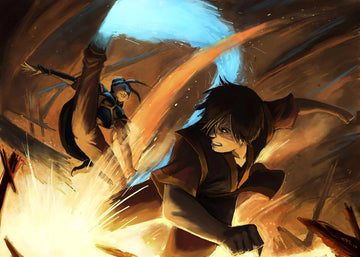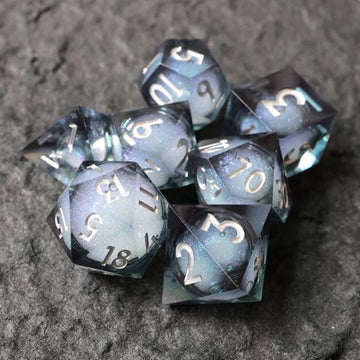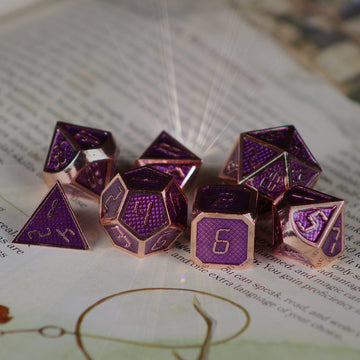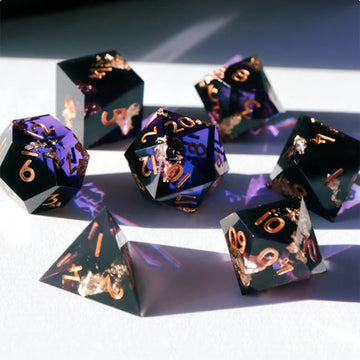Title image © thevampiredio
How to Have Spell Duels in DnD 5e
Dnd spell duels... aka wizard duels... aka mage battles... aka spellcaster combat...
They are so common in fantasy (and superhero) fiction that they have their own page on TV Tropes.
But guess what?
You can't play them in DnD 5e.
I mean... you technically CAN have a spell duel... but they suck.
Rules as written, two spellcasters just cast spells at each other until one dies. Granted, there is a little bit of defense with spells like Shield and Dispel Magic, but all the spectacle, nuance, and tactics that make wizard battles some of the coolest things ever are all missing. It's boring and predictable.
The closest thing we have is Counterspell... which... well... I already wrote a whole blog post about how it sucks, but also the ways to fix it (READ IT HERE NOW).
But to REALLY have cool spell duels and wizard battles in the midst of a combat encounter, we need to kick up the standard combat encounter rules a notch, and create specific spell duel mechanics.
This is what this post is: spell duel rules so the spellcasters can fly above the battlefield and fight the big bad lich while the martial fighters take down the lich's monster or minions.
Narrow? Maybe.
But oh boy, oh boy does it fill a gaping hole in our D&D 5e campaigns!
Table of Contents
-
Why Do We Need Mage Duels?
-
What is a "Wizard Battle"?
-
The Awesome Dice 5e Spell Dueling System
-
Small Changes to the Standard Rules
-
Beginning and Ending a Wizard Duel
-
Step 1: Determine Initiative for that Round
-
Step 2: Describing the Spell
-
Step 3: Recognizing the Spell
-
Step 4: The DEFENDER Picks a Spell to Use as a Counter
-
Step 5: The DEFENDER Attempts to Counter the ATTACKER'S Spell
-
Step 6: Resolving (ATTACKER Action)
-
Optional Additional Rules
-
Common Questions About These Spell Duel Rules
-
What's the Rationale for All These Changes?
-
What are the Martial Characters Doing?
-
What if Several Players are Fighting a High-Level Enemy Caster?
-
Can Any Caster Class Participate in a Spell Duel, or Is It Limited to Wizards?
-
Can Low-Level Spellcasters Use These Rules?
-
Can Players Stack Spells?
-
Can I Use Melee in a Spellcasting Duel?
-
What Makes These DnD 5e Wizard Duel Rules Different?
-
Conclusion
© Nickelodeon
Why Do We Need 5e Mage Duels?
Because for many players, fantasy TTRPGs are about living our favorite fantasy adventures. And as I have mentioned in places like our 5e stealth rules or long distance travel mechanic (not to mention the complaints of countless other 5e content creators in their posts and videos) the standard 5e rules, both for ordinary combat and role-playing, do not cover all the elements of a fantasy adventure that players love.
Homebrew is necessary to play a robust fantasy TTRPG adventure.
Dungeons and Dragons is GREAT at allowing players to find out about an ancient fortress in a small town, explore that fortress, and fight a monster at the heart of the fortress... ya know... the DUNGEONS and DRAGONS parts!
But players also really, really, really, really, really, really want to:
- Creatively deflect spells like Voldemort vs Dumbledore...
- Snatch our enemy's staff and make them spin on the floor like Saruman did to Gandalf...
- Overwhelm and overpower with elemental forces like Zuko vs Azula...
When we read Harry Potter or watch Dr. Strange, these spell duels captured our imagination, compelling us to live them ourselves via our 5e campaigns. And to have magical duels of this kind, we are going to need some simple rules.
What is a "Wizard Battle"?
Ok, so we want to create mechanics so we can engage in mage duels as epic as our favorite ones in literature and film. To do that, we first need to know what makes a spell duel. We need a loose definition to guide us in the right direction; a north star so we don't lose our way in a sea of unnecessarily complex or outlandish abilities.
So what pieces are seen in the most iconic "wizard duels"?
- Defense Is Important: A well-timed shield spell or a smart distraction can change the fight more than just throwing out the strongest spells. Blocking a spell should feel as good as attacking with one.
- Flexible Planning: Your plan will inevitably change based on how the other caster behaves. In spell duels, spellcasters have to be able to think on their feet and react to their opponent's next moves.
- Outwit Your Opponent: Whether that be redirecting the enemy's energy back at them or trapping them in a precarious position, like chess it is best to be a few moves ahead.
- Creative Solutions: While this is mostly flourish in our favorite stories, it's part of the trope! Rarely does arcane energy just fizzle out and die; more often than not there are spectacular, unique counters to the incoming arcane attack.
- Withstand the Arcane Energy: Controlling and avoiding that much magic is overwhelming and exhausting; whoever can take it will make it.
- Use of Terrain: Objects lying around are tossed in the opponent's direction, and the magical abilities of the casters allow them to run on ceilings and walls, or just fly around and make abnormal use of the space.
I am sure there are some things I missed, but regardless, it is clear that in such discussions a spell duel is so much more than attacking and making saving throws. Consequently, we will need additional mechanics to make this vision a practical reality in our 5e campaigns.

© KnightOfAnsatsu
The Awesome Dice 5e Spell Dueling System
For the sake of clarity, from now on when I say "ATTACKER" I am referring to the dueling caster that is attacking with a spell as their action, and when I say "DEFENDER" I am referring to the spellcasting dueling opponent, a combatant countering said spell. Since players can be either one, I must avoid using "monster" or "NPC."
Main Changes to the Standard Rules
In order to make these rules as accessible to as many tables as possible, I have tried to ADD rules rather than CHANGE existing rules... as much as possible.
With that in mind, here is what STAYS THE SAME:
- Action Economy: Each player has their normal set of actions (action, bonus action, reaction, movement).
- Initiative: Players still roll for initiative as normal.
- Spell Slots: Are consumed as normal.
- Resolving Attacks: Players still roll against AC, or roll a saving throw against DC.
- Damage: Spells still do the standard amount of damage to HP as they would in a normal combat encounter.
- Spell Conditions: Behave as normal.
And here is what CHANGES in a 5e mage duel:
- Action Economy: The use of reactions is expanded.
- Initiative: Initiative is rolled again every round.
- Resolving Attacks: There is an additional step before there is any rolling an attack or saving throw.
- Damage: Spells do minimal damage if countered.
- Spell Conditions: Optional rule to make them less powerful.
- Unique Spell Rules:
- Counterspell: These rules render the 3rd level spell "Counterspell" useless, as the DEFENDER can use virtually any spell to counter the spell of the ATTACKER. If a player knows Counterspell, allow them to learn/prepare a different spell specifically for spell duels.
- Magic Missile: Cannot be countered by the DEFENDER, but it's so ubiquitous that DEFENDERS have advantage to recognize it.
- Dispel Magic: Alternatively, a spellcaster can use Dispel Magic as a dueling counter. When a dueling spellcaster does so, she does not need to identify the spell being cast. When Dispel Magic is used as a dueling counter, it is not modified by any of the circumstances in the table below.
Beginning and Ending a Wizard Duel
Two things you need to know about starting a mage duel:
1) These are for COMBAT ENCOUNTERS... spells fired in anger! Not some skill test at school, competitions amoung friends for a specific prize, or experiments with special magic among colleagues... I label that as "spell sparring." For non-lethal duels/tests of arcane strength, heck out Petulant Pip's rules.
2) A spell duel happens because the players or DM want it to happen and the DM allows it to happen (yes, it's that simple... one side just initiates it and if the DM thinks it's appropriate, then it goes down. Let's not swat flies with a sledgehammer here).
3) At the start of the duel, it is preferable that spellcasting duelists remove themselves to a different area of the battlefield, as martial classes are not allowed to interfere. However, if you want the two groups mixed but not interacting, that works too.
4) The loser of the duel may only flee the duel once they have been reduced to at least 1/4 of their health.
Step 1: Determine Initiative for that Round (ATTACKER AND DEFENDER)
At the start of each round, players roll initiative, just like normal.
Yes, at the beginning of every round of a spell duel, NOT at the beginning of every combat encounter. Because otherwise whoever happens to roll higher before the encounter start would have a huge advantage the rest of the combat encounter. When it's the next round, then everyone rolls initiative again.

Step 2: Describing the Spell (ATTACKER)
Now we know who is going first, and that person begins to cast a spell.
But they don't cast yet... they DESCRIBE what the casting process looks like.
I repeat, they DO NOT declare WHAT spell they are casting.
THIS IS SUPER IMPORTANT AND CANNOT BE SKIPPED.
The fun is lost of they declare "I cast fireball." It's epic in a standard combat encounter, but all the mystique and intrigue is lost in a spell duel.
But the DEFENDER still needs some sort of clue as to what spell is about to be cast. They need to determine whether or not the ATTACKER'S spell is worth countering and whether or not they SHOULD use a bonus action to identify the spell.
Most campaigns allow for players to express their creativity in how spellcasting works for their character. The description should not immediately give away what spell is being cast, but it should hint at the spell's level, school of magic, and whether it will be a saving throw or attack roll.
Bottom line: the description should HINT AT the spell, and provide a clue as to whether or not the opposing caster wants to counter it.
Step 3: Recognizing the Spell (DEFENDER Bonus Action)
The ATTACKER just described a spell... and the DEFENDER thinks it is worth sacrificing a bonus action and reaction to counter it. But before the spell is countered, the DEFENDER needs to figure out WHAT is being cast.
The assumption is simple: you cannot counter a spell unless you pretty much know what the spell is. This is why Counterspell is not allowed in these homebrew spell duel rules (and honestly is a huge flaw with Counterspell in general, but I digress...)
DEFENDERS have to use their bonus action to attempt to recognize a spell.
And yes, if they have other spells that take up a bonus action, they are unable to cast those spells and cannot convert said spells into actions!
Recognizing the ATTACKER'S spell is basically a special action that consumes your Bonus Action. This is built into the strategy of the mechanic, players have to decide if giving up their bonus action is worth potentially countering an incoming spell.
To recognize a spell, the DEFENDER has to make a skill check, and it is up to the player/DM as to what is appropriate for the situation. Arcana (what kind of magic?), Perception (what kind of hand movements?), and Insight (what strategy are they using?) are all valid in my opinion.
The DM sets the DC for this skill check (good scaling DC by levels guide here). It can be the same for all spells in the spell duel, or it can change based on the level or arcane knowledge of the player character.
Of course, certain characters should be better at this than others, right? Especially if they are the same class or know the spells themselves. Which is why I have provided a few bonuses for DEFENDERS when trying to recognize a spell:
- DEFENDER is the same class and knows the exact spell = automatic recognize (no roll needed).
- Knows the same spell = advantage to recognize.
- Spell list of class/subclass focused on the same school of magic = +2 to recognize (idea being that they are familiar with that type of magic).
- Are same class = +1 to recognize.
- Have seen the spell previously in the campaign = normal roll.
- If none of the above, and different school/different class = -2 to recognize.
Don't like these? Too many or too few? Change them and tell us in the comments what you would do instead.
If a player does NOT recognize the spell, they CANNOT counter it. You can't just throw up magic and hope it works (see optional rules if you hate this idea with every fiber of your being).

© KnightOfAnsatsu
Step 4: The DEFENDER Picks a Spell to Counter With (DEFENDER Reaction)
Once the DEFENDER identifies the spell being cast by the ATTACKER, it's their turn to get creative!
You might want to restrict what can and cannot counter, but in my opinion, if the player can justify why their spell would counter the ATTACKER'S spell, then it's fair game! That would include:
- Spells of the same school of magic.
- Spells with same/different energy.
- A spell that feels like the opposite of the spell being cast.
- Spells that "get in the mind" of the ATTACKER and cause them to miss.
- Spells that create difficult terrain and impact the accuracy of the ATTACKER.
- Spells that thwart the ATTACKER'S ability to cast properly (verbal, material, somatic components).
Long story short... get creative and have fun with it! But regardless or what you choose...
The DEFENDER uses their reaction to counter a spell in a wizard duel.
Even if the spell is not a "reaction" spell...
Even if it is a high level spell...
Even if it is just a lil' ol' cantrip...
The DEFENDER countering the ATTACKER'S spell consumes the DEFENDER'S reaction.
Basically, in a spell duel, you have the opinon of turning your reaction into a special counterspell action.
Step 5: The DEFENDER Attempts to Counter the ATTACKER'S Spell
But just because the DEFENDER knows the ATTACKER'S spell and wants to counter it doesn't mean they will automatically succeed!
In order to determine if a spell is countered or not, both the ATTACKER and DEFENDER:
- Place a hidden d10 with a specific number face up. This number is the same as the level of the spell they are casting.
- Each reveal their d10 at the same time.
- The difference in spell level gives a bonus to whoever is casting at the higher level (consult Arcane Eye's chart below).
- Both roll Arcana checks, adding any relevant modifiers.
- Whoever rolls higher wins!
If each spell is of an equal level, then neither side gets additional bonuses to their Arcana check.
Remember, even if the DEFENDER is not successful in countering the ATTACKER, or if the ATTACKER has their spell countered by the DEFENDER, both lose the level of the spell slot they committed to with their d10.
In other words, if you attempt to cast a spell, you lose the spell slot!
Step 6: Resolving (ATTACKER Action)
Now, if the DEFENDER fails to counter the ATTACKER'S spell, then the ATTACKER'S spell goes of as normal; nothing changes. The ATTACKER still rolls to hit, and the DEFENDER still rolls any necessary saving throws.
But even if the DEFENDER does counter the spell, 99/100 times the magic doesn't just fizzle out and go away! No, no, no! It bounces off a shield and blows up a stone wall, or the two spells meet in the air and thunder with arcane energy! Magic is inherently chaotic and cinematic.
In other words, magic doesn't just go away.
In general, if the DEFENDER successfully counters a spell other than a cantrip, then it is up to the player's creativity and the DM's discretion as to what happens:
- Redirected Collateral Damage: Nearby creatures take 1/4 of the damage of the spell (or one damage die).
- Reduced Area of Effect: The AoE is half its normal size.
- Repositioned Area of Effect: The DEFENDER moves the radius of the AoE to within 10ft of their position on the battlemap.
- Reroll Against Concentration: Advantage on any saves and disadvantage on any attacks from concentration spell that lingers every round.
- Resisted Condition: The DEFENDER resists the spell, but maybe suffers a minor penalty to movement (5 or 10ft) or takes -1 to their next roll.
When the DEFENDER counters a spell, they either redirect, reduce, reposition, reroll, or resist the spell.
NOTE: If the spell is successfully countered AND the player(s) succeed their saving throw, then YES, the damage is cut in half AGAIN.
These rules have the added bonus of making sure no spell is a total waste of time, a common complaint with 5e Counterspell. Even if your spell is countered, SOMETHING will happen, and it depends entirely upon the type of spell the ATTACKER casts.

Art by Mary GrandPré © J.K. Rowling
Optional Additional Spell Duel Rules
Some people like their homebrew rules as simple as possible. Other people pick it up quick and want as much detail and opportunity for strategy as possible. For the tactically minded, here are some optional rules you can consider for each step of the spell duel process.
"Casting on Adrenaline" (Step 1): I love the idea of a spellcaster, full of adrenaline, just hurling spell after spell with reckless abandon. If you want a mechanic to provide that feel in the game, give them an option for taking a +1 to their Arcana check in Step 5 or every round in a row where that player rolls to go first in initiative... but for every +1 they accept, they also take a -1 to counter any spell that targets them! If you are using our Con Sorcerer guide, then I would ive them advantage on this.
"Deceiving Your Opponent" (Step 2): If you want more deception in your spell duels, a player can make a description of a spell, and then only cast a cantrip. If that is the case, then they make a Deception check for Step 5, not an Arcana heck. And if the DEFENDER believes they are casting a big spell and attempts to counter, then they have disadvantage on their next counter OR they are unable to counter the cantrip attack (would LOVE more playtesting on this).
"Hail Mary" (Step 3): If the DEFENDER does not recognize a spell and wants to counter by just throwing up random magic, then they make their competing Arcana check at -2 to their roll and with disadvantage.
"Withstanding the Power" (Step 4): If the player chooses to counter with the exact same spell, you can have them be blasting magic at one another, attempting to overpower the other as the immense magical power splinters and cracks. In that case, both the DEFENDER and ATTACKER must roll additional Athletics checks or Constitution saving throws in order to withstand the arcane energy. The first spellcaster with two failures is overpowered by the spell, suffering the spell's effects as normal. This can be resolved in the same round or with rolls every round.
"Difference Sources of Strength" (Step 5): Not all classes are good at Arcana! I intentionally state that countering requires a competing Arcana check (INT) because I believe Wizards should have a distinct advantage in spell duels. However, if you want each spellcasting class to use their spellcasting ability for their Arcana check, go for it.
"Wild Magic Reactions" (Step 6): Depending on what spell the DEFENDER uses to counter, the DM can choose for there to be an "explosion" magic random table. World Anvil and jb01234 on GM Binder both have excellent wild magic tables, but here are some of my ideas (d100):
- 0 - 11: Fizzles out and does nothing
- 12 - 35: (# of combined spell levels)d6 explosion
- 36 - 48: Difficult terrain
- 49 - 59: Magical area of advantage when casting
- 60 - 70: Magical area of disadvantage when casting
- 71 - 84: Magical area that deals damage to anyone in it
- 85 - 99: Lingering spell (swirling vortex. Can use it to combine with another spell).
- 100: Portal to inner or outer plane opens.

© Embracer Group
Common Questions About These Spell Duel Rules
What's the Rationale for All These Changes?
My perspective is that during a wizard duel, everyone's magic is going full blast. It's like in sci-fi movies when the captain says "all power to weapons and shields." All attention and arcane energy is hyper focused and in the moment, causing everyone to be better at attacking, identifying, and defending.
In a sense, the spellcasters are running on adrenaline in a spell duel. if you want to impose a level (or two) of exhaustion after engaging in a wizard duel, be my guest.
Admittedly, these are not "rock solid arguments"... more like paper thin justifications to overcome the part of you want wants everything to make sense so you can play something awesome.
What are the Martial Characters Doing During the Spell Duel?
Having a normal combat encounter with the enemy spellcaster's minions, servants, or monsters. If you would like them to have a separate duel, but with martial weapons, then check out these rules from Gyutaan on GM Binder.
What if Several Players are Fighting a High-Level Enemy Caster?
If a caster is 2x the level of the highest level, opposing spellcaster, then they get an extra turn. This allows for multiple casters to attack a single, more powerful caster and have fun, rather than just turning them into a smoking pile of ash in a single round.
Can Any Caster Class Participate in a Spell Duel, or Is It Limited to Wizards?
Any class that can use spells can join in as the PC or NPW! Wizards might look like the best option for duels, but Bards, Clerics, Warlocks, Sorcerers, Artificers, and Druids can participate. Hell, even HALF CASTERS can contribute so long as they have he spell slots!
Can Low-Level Spellcasters Use These Rules?
Yes, but they will run out of spell slots very, very fast. These rules are better for spellcasting classes level 5 and above.

Instant Moment © A. Shipwright
Can Players Stack Spells?
Had to take inspiration from the DC20 spellcasting mechanic... if players want to use their turns to combine a spell, they must know the same spell and the spell must be capable of being combined (DM discretion). They use their actions to roll Arcana checks to combine the sells (DC determined by DM). They must maintain concentration throughout the entirety of both their turns for both rounds. If allowed/successful, they add +10 to their rolls for that spell, and the damage if the spell is doubled.
Can I Use Melee in this Spellcasting Dueling System?
The use of melee would be strictly forbidden in a sparring contest at a magic gym or something... but I see no reason why two spellcasters can't attempt to close the gap and smack the shit out of one another.
But... these spell duel rules can only be used on two opposing spellcasters... a barbarian with no magic cannot attempt to impose a magic battle when all they can do is run up and beat the lich to death with a club. Of course, there are any number of notable exceptions, such as a martial character using a magic item, or a monk's ki abilities.
What Makes These DnD 5e Wizard Duel Rules Different?
- Strategy: Players do so much more than say "I cast Counterspell" or "I block."
- Engaging: Players feel both powerful and vulnerable at the same time.
- Unpredictable: Let the dice make it crazy, and when magic collides, have crazy stuff happen (collateral damage).
- Player Agency: There is little additional rolling, with an emphasis placed upon player creativity and decision making.
- Simple: Very few rule changes, a few rule additions, and a single chart. Takes less than 10 minutes for players to learn.
- Mystery: The creativity in choosing spells to counter with and describing spell reactions is unpredictable and allows magic to be enchanting and fascinating once more.
- Multiple Casters: They allow for several spellcasters in an adventuring party to collectively fight a single, more powerful foe.
Conclusion: Sometimes Better than 5e Counterspell
While I am proud of these spell duel rules, they are not a replacement for standard combat encounters, nor are they a fix for 5e Counterspell. Rather, they are reserved for the unique and occasional situations when player(s) want to face off against an enemy caster in a spell duel... one on one (most of the time).
It's a special form of combat encounter that doesn't take long for your players to learn, but allows them to find creative uses for the various spells they know.







